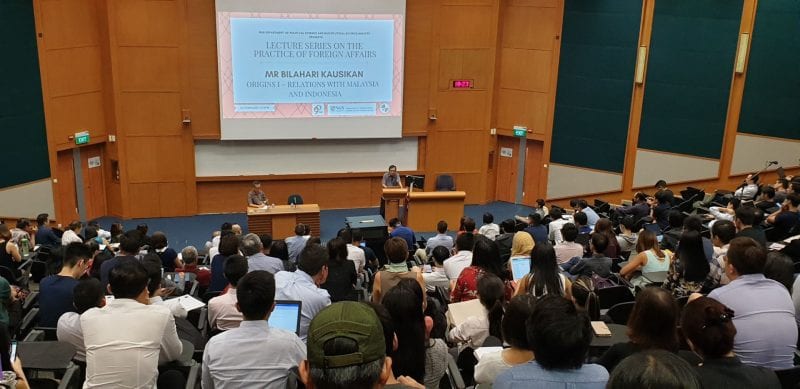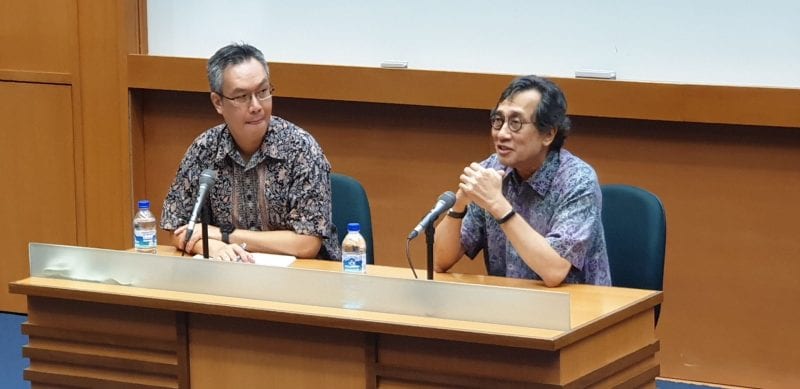On 20 February 2019, Mr Bilahari Kausikan (Arts and Social Sciences ’76) presented the complex and sometimes tense bilateral relations Singapore has with Malaysia and Indonesia, while concisely describing the importance of understanding Singapore’s rather different relationship with each.
Kausikan was candid when describing Singapore’s sovereignty, “The governments of our neighbours deal with Singapore as a sovereign nation because we have developed capabilities,” he said.
Bilateral Relations with Malaysia
Given recent public discussions over the deferment of the Singapore-KL high-speed rail, the Instrument Landing System (ILS) over Seletar Airport and the extension of Malaysia’s port limits into Singapore waters, it was no surprise that Singapore’s bilateral relations with Malaysia took centre stage during his lecture.
Mr Kausikan cautioned against assuming recent differing opinions were solely due to the surprise election of the Pakatan Harapan (PH) government in Malaysia and the return of Dr Mahathir Mohamad as Prime Minister of Malaysia.
“We should not place too much emphasis for the current situation on PM Mahathir,” he said. “These are not new issues; they are very old issues … this is the fourth iteration.”
Mr Kausikan was optimistic the next generation of Singapore’s leadership is capable. In particular, he singled out Minister of Finance Heng Swee Keat, former Principal Personal Secretary to the late Mr Lee Kuan Yew and Minister of Trade and Industry Chan Chun Sing’s tenure as Chief of the Army. Their vast experiences can inform Singapore’s future foreign policies.


Bilateral Relations with Indonesia
Mr Kausikan emphasized that while Singapore’s relations with Malaysia and Indonesia are similar, there are some differences.
He highlighted Indonesia under President Joko Widodo’s administration is “much more interested in domestic issues (like) alleviating poverty and doing things for his own people, (concerning himself) with foreign policy only to the degree that it contributes to that.”
Since 2014, Singapore has been Indonesia’s largest foreign investor with US$8.4 billion in realised investments in 2017 alone. Cordial bilateral relations advance Indonesia’s domestic goals while allowing Singapore access to the largest economy in ASEAN. Both are among each other’s top trading partners and source of visitor arrivals.
Importance of Regional Cooperation
He emphasized putting aside differences and cooperating whenever possible throughout the discussion. When asked about the threat of cross-border terrorism by a member of the audience, he replied the security departments of the three countries collaborated closely to ensure safety. This was a good example of Singapore, Malaysia and Indonesia working together towards a common goal.
“The Malaysian Special Branch, the equivalent of our ISD, is extremely professional and cooperates closely with our security authorities” he said.
Later, he recounted a 2016 incident when Indonesian authorities arrested a group of militants planning to launch rockets towards Singapore from Batam, as an example of Indonesia-Singapore addressing cross-border terrorism.
Mr Kausikan stressed that Singapore “can cooperate with our neighbours, should cooperate, and in fact must cooperate” while safeguarding and advancing national interests.
Watch the lecture here.
—-
About the Speaker
Bilahari Kausikan is Chairman of the Middle East Institute, NUS. From 2001 to 2013, he was first the second Permanent Secretary and then Permanent Secretary of the Ministry of Foreign Affairs (MFA). He was subsequently Ambassador-at-Large until May 2018, having previously served in various MFA appointments, including as the Deputy Secretary for Southeast Asia, the Permanent Representative to the United Nations in New York and as Ambassador to the Russian Federation.
FASS90 Political Science Lecture Series on the Practice of Foreign Affairs
This five part lecture series is organised by the NUS Political Science Society with support from the Faculty of Arts and Social Sciences (FASS) and the Department of Political Science. Established in 1929, FASS, one of the earliest and largest faculties is celebrating its 90th anniversary this year. Whilst witnessing numerous changes, we remain steadfast to our vision to strive forward as a premier faculty of excellence in humanities and social sciences that nurtures tomorrow’s engaged, thoughtful and creative global citizens. To mark this occasion, the Faculty is organising a series of events showcasing the strength and breadth of the Faculty’s research as well as kick start future initiatives that would benefit the generations of students who will come through our halls.